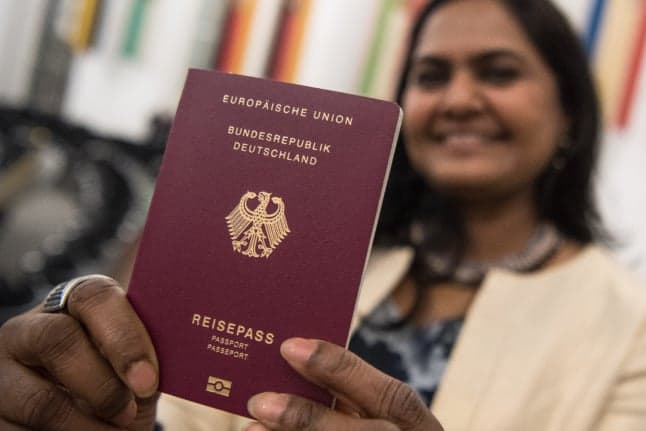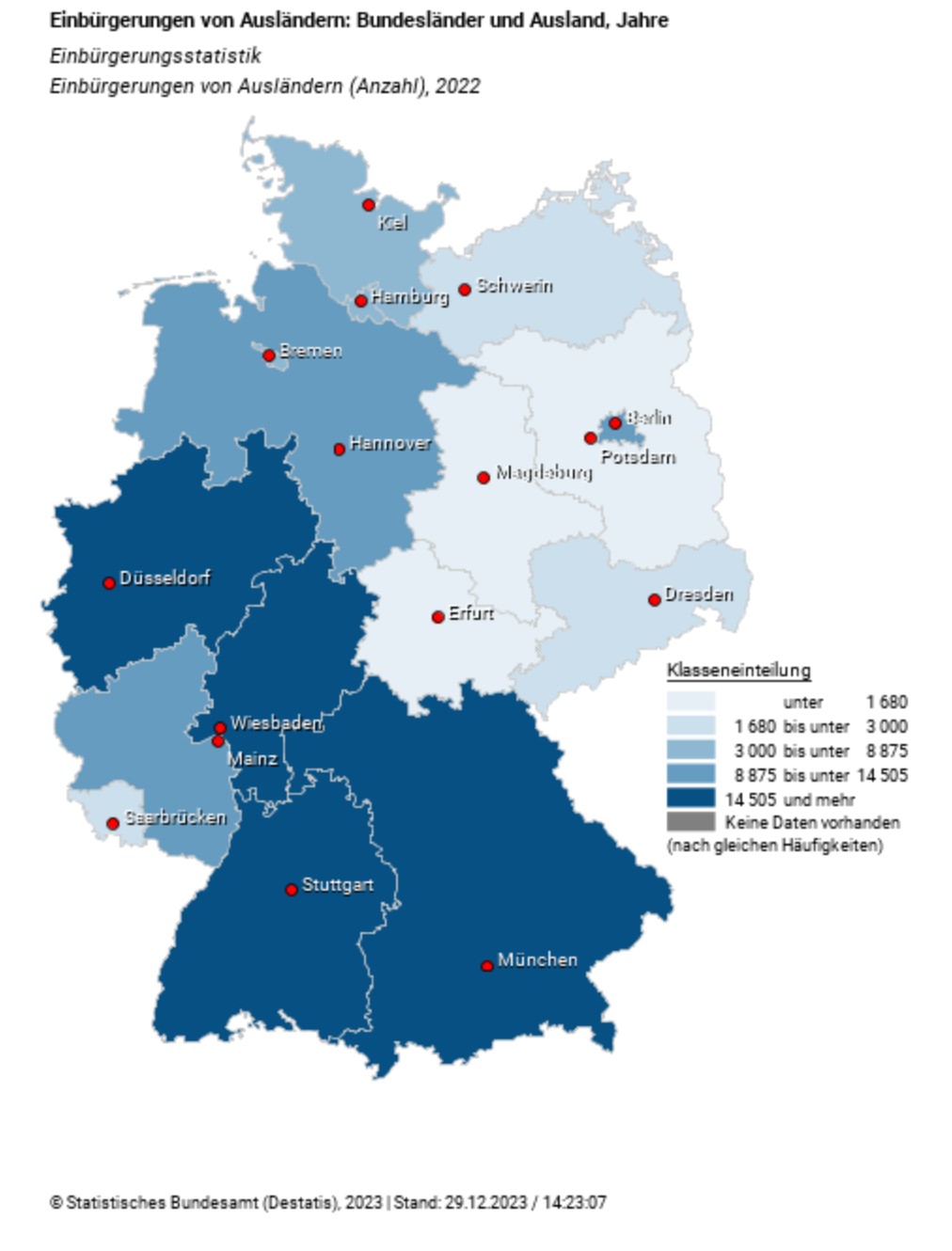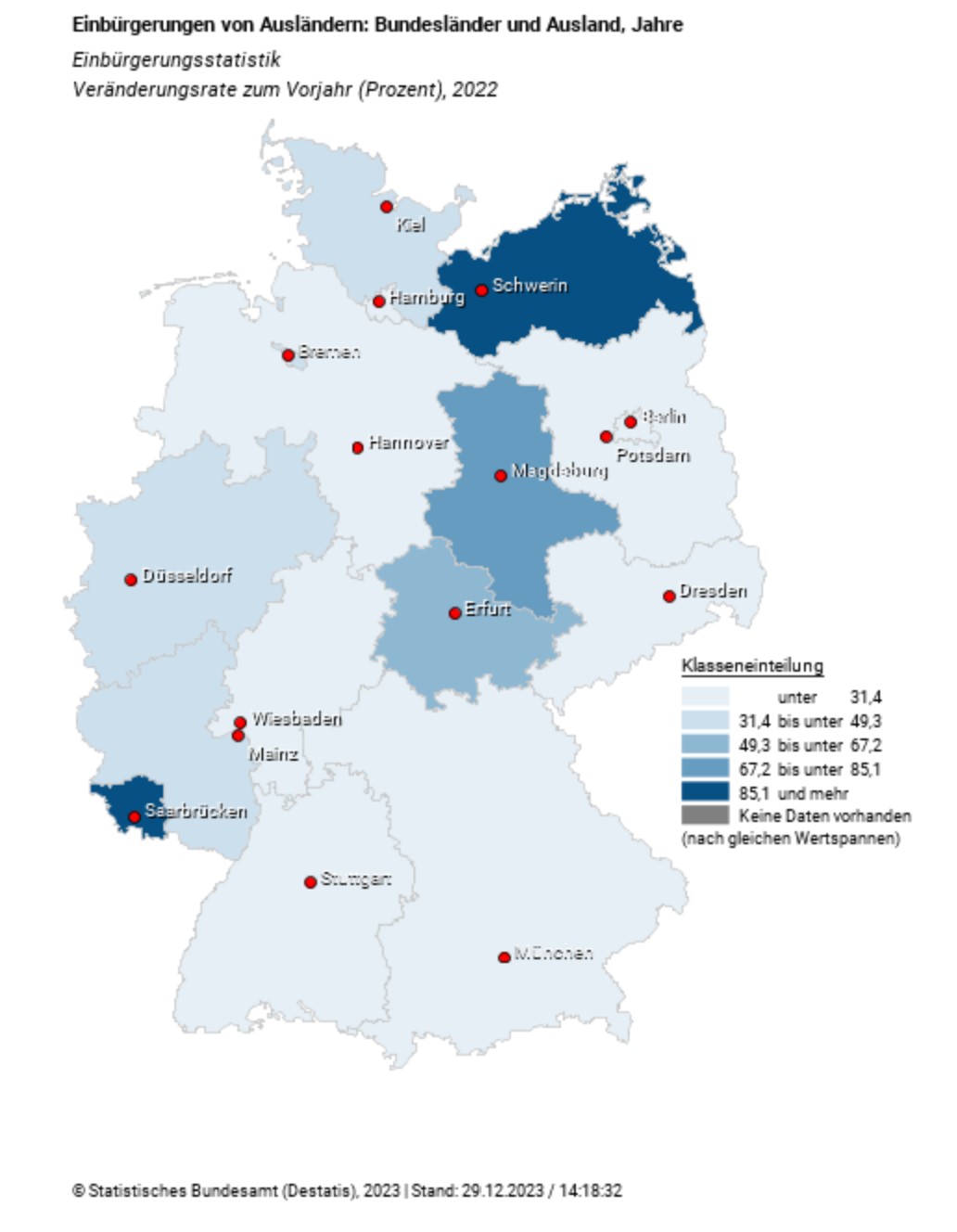Who are the foreigners getting German citizenship?

Despite delays to Germany's upcoming draft law on dual citizenship and the backlogs in applications, the last few years have seen a jump in those applying to naturalise as German. But who are these new Germans and where do they live?
Ever since the current traffic light coalition announced in 2021 that it would allow dual citizenship for everyone naturalising as German - plenty of foreigners here have spent the last two years prepping their applications and biding their time to finally be able to apply for German citizenship while keeping their old passport.
With the draft law best by numerous delays since, numbers from the last few years show many haven't waited.
According to official government statistics, 168,775 people became German in 2022. That's a 28.3 percent increase over the 131,595 people who became German in 2021 - a year which already itself saw a level of applications not seen for around 20 years – when record numbers of people were naturalising as German in the 1990s and early 2000s.
READ ALSO: Germany's dual citizenship law 'could be passed in January'
Both 2021 and 2022 though, are still far off the all-time record set in 1995, when 313,000 went through the Einbürgerung – or naturalisation – process.
2022 continued an upward trend in naturalisations after numbers stalled steady from about 2010 to 2018, with around 110,000 or so taking up German citizenship annually in those years.
Although becoming German was a more gender-balanced affair in 2021, 2022 saw new naturalisations skew male. 90,800 men became German in 2022, compared to 77,975 women. For some nationalities - particularly Syrians naturalising as German - getting German citizenship was a very male affair. A full two-thirds of the Syrians who took up German nationality in 2022 were men.
READ ALSO: Should you apply for German citizenship before or after the new law comes in?
Where did 2022's new Germans come from?
Syrians were far and away the most common original nationality taking German citizenship in 2022 - something that was also true in 2021. In 2022, 48,285 Syrians naturalised as German. By itself, that's over 28.5 percent of the total overall number. It's also a significant climb from the 19,000 or so who naturalised in 2021.
This is likely because many of the refugees who arrived in Germany in 2015 and 2016 only became eligible in 2022.
Turks came in second place with 14,265 naturalising in 2022 - and are the only other nationality where more than 10,000 naturalised as German in 2022.
Romanians rounded out the top three with nearly 7,000 naturalisations, followed by Iraqis (6,815), Ukrainians (5,565), and Poles (5,555). All other nationalities saw less than 5,000 naturalisations apiece.

A newly naturalised German shows her citizenship documents at Rathaus Neukölln in Berlin. Photo: picture alliance / dpa | Klaus-Dietmar Gabbert
Brits naturalised in record numbers in the years immediately following 2016's Brexit referendum - in a bid to keep both British and German citizenship before the UK left the EU - as EU nationals are already allowed dual citizenship in Germany.
That number has dropped off in recent years, with around 4,500 naturalising in 2021, but only around half of that (2,315) getting German citizenship in 2022.
2022 also saw 3,685 Israelis, 2,775 Indians, 2,580 Americans, 1,325 Brazilians, 165 Aussies, 150 Canadians, 70 Irish, and 15 New Zealanders become German - among many others, of course.
From within the EU, a particularly high number of Bulgarians (2,135), Greeks (2,970), and Italians (4,510) also naturalised as German in 2022.
READ ALSO: What are the next steps for Germany's long-awaited dual nationality law?
Where do Germany's new citizens live?
Official statistics measure where someone was living at the time they became German - as people have to apply to their responsible local authority in Germany to naturalise.
Of the 168,000 or so people who naturalised as German in 2022, over 40,000 lived in the most populous state of North Rhine-Westphalia. Meanwhile, Bavaria saw just over 28,000 and Baden-Württemberg nearly 21,000.

Map of German naturalisations in 2022. Although the most populous states tend to see the most, Berlin has a particularly high number of new Germans relative to its population. Eastern German states have recently seen a much larger increase in naturalisations. Image: Destatis
Relative to population, Berlin also saw a huge number of naturalisations - with a 13.5 percent increase of 2021 numbers to nearly 9,000.
The biggest jumps though, were seen in some unexpected places. Mecklenburg-Vorpommern on the northeast coast saw a 95 percent jump in naturalisations - with 1,680 becoming German there. Saarland saw a 103 percent increase to 1,695. Saxony-Anhalt and Thuringia also saw increases of well over 50 percent.

Although their overall numbers are still low compared to other federal states, Mecklenburg-Vorpommern and Saarland saw huge increases in the number of people applying to become German there in 2022. This map records the rate of the increase, as opposed to the overall numbers shown in the first map above. Image: Destatis
What about the next few years?
Provided the new draft law on dual citizenship does pass in early 2023, the numbers for the next few years may look considerably different, as longtime residents finally apply for citizenship to allow them to retain their previous passport.
As it stands now though, dual citizenship is already relatively common in Germany, with over two-thirds of people who naturalised in 2021 having done so while keeping their previous passport.
OPINION: Critics need to wake up to the reality of dual citizenship in Germany
Comments
See Also
Ever since the current traffic light coalition announced in 2021 that it would allow dual citizenship for everyone naturalising as German - plenty of foreigners here have spent the last two years prepping their applications and biding their time to finally be able to apply for German citizenship while keeping their old passport.
With the draft law best by numerous delays since, numbers from the last few years show many haven't waited.
According to official government statistics, 168,775 people became German in 2022. That's a 28.3 percent increase over the 131,595 people who became German in 2021 - a year which already itself saw a level of applications not seen for around 20 years – when record numbers of people were naturalising as German in the 1990s and early 2000s.
READ ALSO: Germany's dual citizenship law 'could be passed in January'
Both 2021 and 2022 though, are still far off the all-time record set in 1995, when 313,000 went through the Einbürgerung – or naturalisation – process.
2022 continued an upward trend in naturalisations after numbers stalled steady from about 2010 to 2018, with around 110,000 or so taking up German citizenship annually in those years.
Although becoming German was a more gender-balanced affair in 2021, 2022 saw new naturalisations skew male. 90,800 men became German in 2022, compared to 77,975 women. For some nationalities - particularly Syrians naturalising as German - getting German citizenship was a very male affair. A full two-thirds of the Syrians who took up German nationality in 2022 were men.
READ ALSO: Should you apply for German citizenship before or after the new law comes in?
Where did 2022's new Germans come from?
Syrians were far and away the most common original nationality taking German citizenship in 2022 - something that was also true in 2021. In 2022, 48,285 Syrians naturalised as German. By itself, that's over 28.5 percent of the total overall number. It's also a significant climb from the 19,000 or so who naturalised in 2021.
This is likely because many of the refugees who arrived in Germany in 2015 and 2016 only became eligible in 2022.
Turks came in second place with 14,265 naturalising in 2022 - and are the only other nationality where more than 10,000 naturalised as German in 2022.
Romanians rounded out the top three with nearly 7,000 naturalisations, followed by Iraqis (6,815), Ukrainians (5,565), and Poles (5,555). All other nationalities saw less than 5,000 naturalisations apiece.

Brits naturalised in record numbers in the years immediately following 2016's Brexit referendum - in a bid to keep both British and German citizenship before the UK left the EU - as EU nationals are already allowed dual citizenship in Germany.
That number has dropped off in recent years, with around 4,500 naturalising in 2021, but only around half of that (2,315) getting German citizenship in 2022.
2022 also saw 3,685 Israelis, 2,775 Indians, 2,580 Americans, 1,325 Brazilians, 165 Aussies, 150 Canadians, 70 Irish, and 15 New Zealanders become German - among many others, of course.
From within the EU, a particularly high number of Bulgarians (2,135), Greeks (2,970), and Italians (4,510) also naturalised as German in 2022.
READ ALSO: What are the next steps for Germany's long-awaited dual nationality law?
Where do Germany's new citizens live?
Official statistics measure where someone was living at the time they became German - as people have to apply to their responsible local authority in Germany to naturalise.
Of the 168,000 or so people who naturalised as German in 2022, over 40,000 lived in the most populous state of North Rhine-Westphalia. Meanwhile, Bavaria saw just over 28,000 and Baden-Württemberg nearly 21,000.

Relative to population, Berlin also saw a huge number of naturalisations - with a 13.5 percent increase of 2021 numbers to nearly 9,000.
The biggest jumps though, were seen in some unexpected places. Mecklenburg-Vorpommern on the northeast coast saw a 95 percent jump in naturalisations - with 1,680 becoming German there. Saarland saw a 103 percent increase to 1,695. Saxony-Anhalt and Thuringia also saw increases of well over 50 percent.

What about the next few years?
Provided the new draft law on dual citizenship does pass in early 2023, the numbers for the next few years may look considerably different, as longtime residents finally apply for citizenship to allow them to retain their previous passport.
As it stands now though, dual citizenship is already relatively common in Germany, with over two-thirds of people who naturalised in 2021 having done so while keeping their previous passport.
OPINION: Critics need to wake up to the reality of dual citizenship in Germany
Join the conversation in our comments section below. Share your own views and experience and if you have a question or suggestion for our journalists then email us at [email protected].
Please keep comments civil, constructive and on topic – and make sure to read our terms of use before getting involved.
Please log in here to leave a comment.